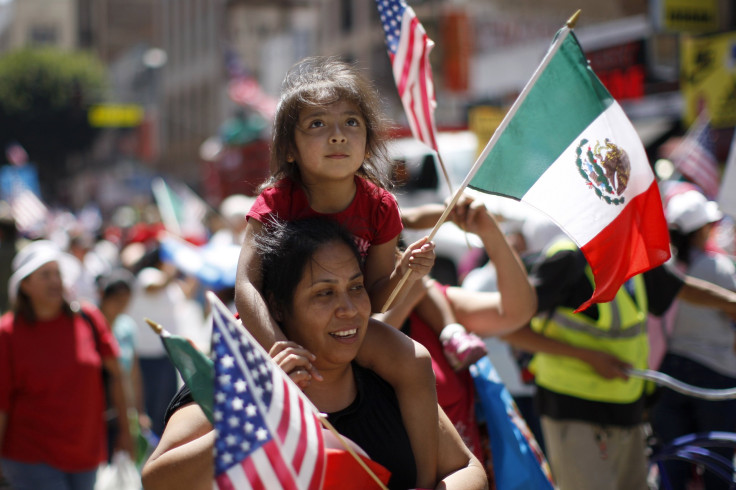Immigration Reform 2013: DREAMers Call On Obama To Expand Deferred Action To Undocumented

Neidi Dominguez, 25, lives in constant fear daily. She was brought to America at nine years old from Morelos, a once- agricultural state in south-central Mexico that’s now moving toward industry and commerce. Neidi remained undocumented until she was 24, when she fell in love and got married to a U.S. citizen. Her spouse petitioned the government for a green card and now Dominguez is what the U.S. government calls a legal resident.
Dominguez’ fear is not for herself, but for her mother, who remains undocumented, and her extended family, aunts and uncles who without official documentation are considered illegal even though they have American-born children. If any of her undocumented family members are at the wrong place at the wrong time, in California that's a sure way to initiate deportation proceedings. The responsibility for Dominguez’ cousins would then no doubt fall on her and her sister, who is a beneficiary of "deferred action."
“It is this constant fear of knowing that there is no guarantee that we can remain together,” Dominguez said during a telephone interview on Thursday. It’s the first anniversary of the Deferred Action for Childhood Immigrants, or DACA, a program that provides a two-year reprieve for work and study to immigrants without criminal records brought to the U.S. as children.
The fate of an estimated 11 million undocumented immigrants hangs in the balance as Congress continues to debate the issue. Progress is stalled by debates over whether the undocumented should get a path to citizenship, or simply legal status, and whether the border is fully secured or more should be done to keep others out. The undocumented population will stay in the shadows for as long as Congress drags on, and the fear will never go away unless something is done to right the broken status quo.
Congress needs a push, says Dominguez, the campaign manager for the California Immigrant Youth Justice Alliance, or CIYJA, a statewide network of immigrant youth that’s calling on President Barack Obama to step in and expand deferred action to the millions waiting for comprehensive immigration reform.
“My family is one of the 11 million families that have to constantly live with that every day,” Dominguez said.
Daily, 1,100 people are deported from the U.S. That more than 30,000 stand to be sent home in August alone makes Dominguez uneasy. Will her family become another statistic? Without intervention by the president, she thinks it’s certainly possible. Maybe not this month. Maybe they will never be caught. Who knows?
“I think that having the president stop the deportation of everyone and provide relief now is what he should be doing as Congress continues to debate immigration reform,” Dominguez said. And as Republicans argue for fairness on the issue, she argues for fairness herself.
“Give the families a relief that they need,” Dominguez said. “DREAMers across the country got relieved a year ago today and now can have work permits and live without fear of deportation, but even that doesn’t guarantee that they one day wouldn’t end up in the wrong situation and still face deportation. But at least there was that small relief that has allowed for more progress to come, and we believe that’s the same kind of relief we need right now, so that Congress can continue to debate immigration reform while at least we have these families not being separated.”
Last year, the Center for American Progress reported that immigrant removal almost doubled from 190,000 in 2001 to nearly 400,000 the past four years. Additionally, in 2011 alone, more than 46,000 parents whose children were born in the U.S. were deported. When children are left behind, they may end up in foster care. It costs about $26,000 a year to foster each child, according to the report.
If Obama expands deferred action, Dominguez said it would show “great leadership” and “true integrity,” given his own words -- that America embraces immigrants and their contribution to the economy.
“It would really give a lot of room and also a lot of pressure for Congress to really get this done,” she says.
If Congress doesn’t fix the system, then it can count on Obama to do it for them, perhaps in a way not to the Republicans' liking, Sen. Marco Rubio, R-Fla., warned this week.
“I believe that this president will be tempted, if nothing happens in Congress, he will be tempted to issue an executive order like he did for the DREAM Act kids a year ago where he basically legalizes 11 million people by the sign of a pen,” Rubio said on Fox News. This legalization, he says, may occur without the features Republicans -- and many Democrats, too -- want, like E-verify, which requires employers to verify electronically the immigration status of prospective workers, or improvements in border security.
At the last minute in June, two Republicans brokered a "border surge" bill with a proposal to spend tens of billions on border security in order to get the main immigration bill through the Senate, which passed it.
Still the White House has told the media that Obama won’t be tempted to use executive action because “the only solution to this problem is for Congress to fix the broken immigration system by passing comprehensive reform.”
“I benefited from DACA at the moment when my family and I were detained by ICE" (Immigration and Customs Enforcement), Jose Urias, from Racho Cucamonga, Calif., said in a statement released by CIYJA. “I’m 16 years old and live with the fear of one of these days coming home to an empty house because ICE came again and took my parents. I believe my parents should have the same relief as I do while Congress debates immigration reform.”
© Copyright IBTimes 2024. All rights reserved.






















